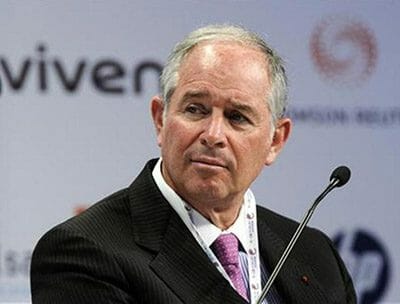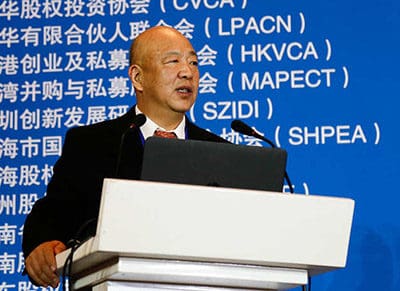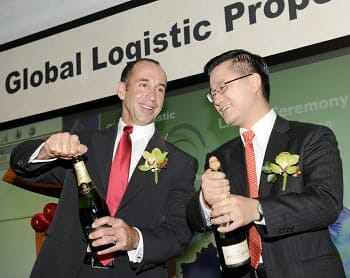
Chairman Seek Ngee Huat (L) and CEO Ming Z Mei have been working together since before GLP was officially established
After a seven month sales process, Global Logistic Properties faces the prospect of having only a single suitor for Asia’s largest warehouse developer as a June 30th deadline for bids approaches.
Over the course of a effort that began even before the $9.9 billion Singapore-listed company hired investment bank JP Morgan for a strategic review last December, some of the world’s largest private equity firms and pension funds including Blackstone, CPPIB and TPG have reportedly turned their backs on a sale that would deliver more than 2,600 warehouse properties globally in one of the industry sectors most favored by real estate investors.
Despite GLP owning a 15.8 million square metre China logistics platform – eight times the size of its next largest competitor, when the company drew up a short list of bidders in February only Blackstone, Warburg Pincus and a mainland consortium led by GLP CEO Ming Mei and director Fang Fenglei committed to the final round.
Global Heavyweights Walk Away From GLP Opportunity

Blackstone chief Stephen Schwarzman is said to have walked away from the GLP competition
By opting not to pursue the GLP deal Investors are walking away from a chance to buy the dominant player in China in one of the most sought after real estate sectors. GLP’s portfolio includes the largest logistics platform in China, US holdings covering more than 170 million square feet, some 40 distribution hubs in Brazil and another 98 logistics centres in Japan.
However, the world’s biggest real estate investors appear to be balking at the prospect of competing with a mainland consortium led by Fang’s Hopu Investment management, along with Zhang Lei’s Hillhouse Capital and Ming Mei. Limited partners in the mainland bid are said to include leading insurers China Life and Ping An, as well as top mainland lender Bank of China and affiliates of mainland ecommerce giants Alibaba and JD.com.
Last week market reports indicated that Blackstone had withdrawn from the process, and an account in the Financial Times on Friday quoted sources familiar with the GLP sale as saying that potential buyers for the company believed that the insider bid assembled by Mei and Fang “made other submissions pointless.”
In addition to Blackstone, private equity giants TPG and KKR, pension fund heavyweight CPPIB chose not to pursue GLP, according to sources who spoke with Mingtiandi about the bidding process.
This lack of interest in the warehouse platform and fund manager comes at the same time that logistics has become a favored asset class among real estate investors and despite GLP’s combination of China dominance and global reach. Through its own joint ventures CPPIB has already committed more than $3 billion to developing warehouses in China and the Canadian pension fund recently signed up to invest another $500 million for distribution centres in India. Blackstone has pursued its own logistics real estate investments in China with developer China Vanke, and recently sold its European warehouse platform Logicor to China’s CIC for $13.8 billion.
Hopu Bid in Pipeline Since 2015

Hopu’s Fang Fenglei
The perception of the Mei-Hopu bid having an inside advantage in the share sale may stem in part from the mainland consortium having reportedly planned a buyout of GLP long before the company first announced a strategic review of its business, which began at GIC’s request in November 2016.
The GLP management-led group hired Goldman Sachs, Citigroup and Morgan Stanley to advise on a management-led buyout of GLP in December 2015, according to sources familiar with the bid. Hopu’s Fang is a former partners in Goldman Sachs, and the three banks are said to continue to advise the Fang and Mei-led consortium.
The GLP management’s link-up with the investment banks is said to have led to a May 2016 bid to buy out GLP at a price of S$2.20 to S$2.30 per share. GLP stock was trading at S$1.81 per share on May 6th, however, that bid was said to have been rejected before being formally presented to the board.
In a conversation with Mingtiandi, a GLP spokesperson denied that any such bid had taken place in mid-2016, and the company has made no statements to the stock exchange regarding any offer at that time.
GLP Defends Process, Halts Trading
Following publication of the Financial Times report, GLP’s shares dropped more than 10 percent on Friday before company management asked the stock exchange for a halt in trading.
In a response to the FT account posted on the company’s website, GLP struck back at the notion that its sale process was being hijacked by an inside bid. The company noted that, “the Strategic Review is being overseen by a Special Committee which comprises four independent directors of the Company, with the assistance of J.P. Morgan (S.E.A.) Limited as financial adviser and Allen & Gledhill LLP as legal adviser;”
GLP reiterated that its strategic review, which is expected to lead to a sale of the company, is being conducted independently and that it has “undertaken measures to alleviate potential conflicts of interest and ensure fairness of the process.” The company also pointed out that it “remains in discussions with shortlisted bidders,” without naming those parties.
An Independent Process Among Old Friends

GLP co-founders Jeffrey Schwartz and Ming Mei celebrating the company’s 2010 IPO
GLP’s special committee overseeing the review is headed by company chairman Seek Ngee Huat, who was the head of GIC Real Estate when the Singaporean sovereign wealth fund teamed with former ProLogis CEO Schwartz and his China-based sidekick Mei to buy out ProLogis’ Japan and China assets and form GLP in 2008. Both GLP CEO Mei and company director Fang have recused themselves from the strategic review process.
Seek became chairman of GLP in June 2014, just three months after the warehouse firm sold a 34 percent stake in its China operations to a Hopu-led consortium in a transaction which provided Mei and Schwartz each with $56.75 million in shares in the China operation, as well as options for another $21 million in shares, according to company records. That deal also provided for Mei and Schwartz along with other members of the GLP management to receive a $233.75 million limited recourse loan from the Hopu-led consortium to buy an allocation of $253.75 million in shares in the China operation made available to the management team under the terms of the deal.
The mainland consortium’s 2014 investment also provided, as incentives to Mei and Schwartz as managers of the company and as approved by GLP’s board, an allocation of $253.75 million in total shares in the China operation financed by a $233.75 million limited recourse loan from the mainland investment consortium. Also included were options for up to five percent of the mainland consortium’s newly issued shares in GLP China for Mei and Schwartz.
Like the current Hopu-led consortium, the 2014 investment is said to have included China Life and Bank of China, according to sources familiar with the two transactions.
Watch for an Extension to the Sale Process
In its statement on Friday, GLP was careful to point out that no result to the sale process is guaranteed and the company is keeping its options open.
“There is no certainty that any proposals will be received or that any definitive transaction will materialize from, or any offer will be made as a result of, any proposals received or the Strategic Review, and there also remains no certainty as to the terms of a transaction (if any),” GLP noted in the statement.
The lack of bidder interest only makes it more difficult for GLP’s committee to bring a quick conclusion to the sale process.
“Ming Mei thought he had an opportunity to buy out a market leading company at a discount,” said a senior executive from a regional industrial property developer not participating in the GLP competition . “But he got too clever, and now they’re going to have to start the process all over again.”
With questions being raised concerning the potential benefits of the GLP sale to its management versus its returns for the citizens of Singapore who funded the company’s establishment and growth with their public pension payments into GIC’s coffers, the negative reviews for the sale process may see the controversy, if not the bidding for the company, continuing to heat up over the summer.
Note: This story updates an earlier version which had included Hillhouse Capital Management as a party to the 2014 Hopu-led investment in GLP. While Hillhouse is understood to be part of the current mainland consortium, it did not participate in the 2014 GLP China share sale. Mingtiandi regrets the oversight.
Leave a Reply